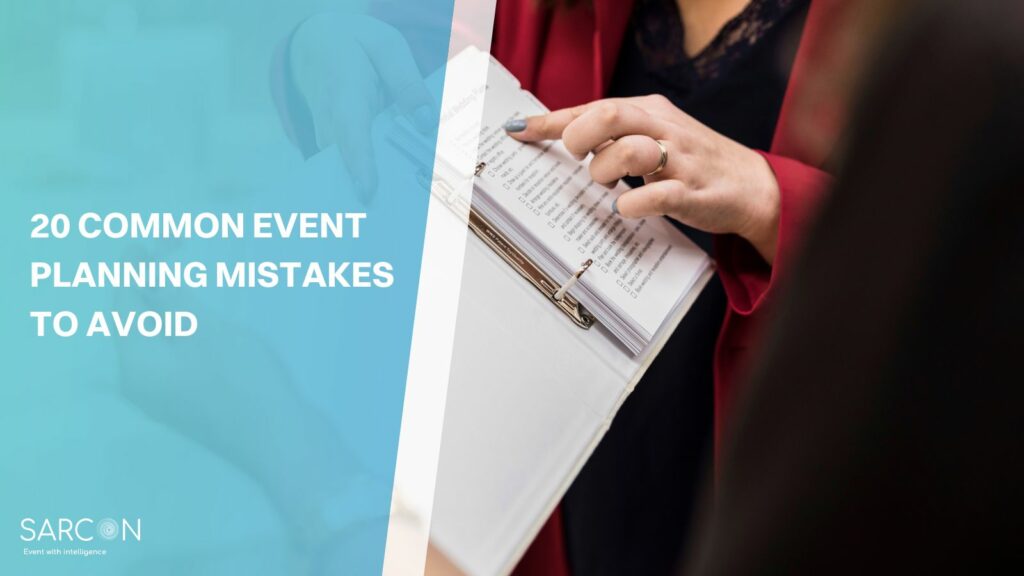Winston Churchill once said, “Plans are of little importance, but planning is essential.” It’s a sentiment that rings truer than ever in the realm of event coordination. But even the most seasoned professionals occasionally stumble into pitfalls that can derail the most carefully laid-out plans.Successful event planning hinges on foresight and preparation. It’s not just about choosing the right flowers or catering; it’s about orchestrating a seamless experience that leaves attendees raving.
Event organisers often encounter unforeseen challenges during their events, leading to last-minute panic and subpar experiences for attendees. Imagine meticulously designing an event, from the theme to the guest list, only to have it marred by avoidable mistakes. But fret not! In this blog, we’re going to unveil the 20 most common event-planning mistakes and equip you with the knowledge and insights to steer clear of them.
-
Failing to Plan Early/ Ignoring Competing Events
Starting event planning too late can limit your options for venues and vendors, potentially leading to higher costs and lower quality. Ignoring competing events means you might inadvertently schedule your event at the same time as a more popular or relevant one, resulting in reduced attendance and media coverage. Early planning allows you to secure desirable dates and gives you time to adjust your event to avoid direct competition.
Solution: Begin planning well in advance, ideally a year or more ahead for large events. Conduct thorough research to identify competing events in your area and choose dates that don’t clash with them. This allows you to secure your desired venue and build anticipation among potential attendees.
-
Not having a plan B
Contingency plans are essential to handle unexpected challenges like bad weather, technical failures, or vendor cancellations. A lack of such plans can lead to confusion and disappointment among attendees.
Solution: Develop a comprehensive contingency plan that outlines potential issues and their solutions. Consult with experienced event professionals to identify common challenges and prepare accordingly. Regularly review and update the plan to stay prepared for unforeseen circumstances.
-
Lack of Clear Objectives: Losing Sight of the Event’s Goal
Without clear objectives, your event can lose focus and direction. Your objectives define the event’s purpose and guide decisions about everything from the choice of speakers or entertainment to marketing strategies. Regularly revisiting your objectives helps you make choices that align with your event’s core goals, making it more meaningful and impactful.
Solution: Clearly define your event’s objectives and make them the guiding principles throughout the planning process. Share these objectives with your team to ensure everyone is aligned.
-
Trying to do it all by yourself
Event planning is a multifaceted endeavour that involves numerous tasks, such as securing a venue, coordinating logistics, marketing, managing finances, handling technical aspects, and more. Trying to tackle all these responsibilities single-handedly can quickly become overwhelming. This can lead to stress, exhaustion, and a decreased ability to perform effectively in each area.
Solution: Delegate responsibilities to a competent team or hire professionals as needed. Identify team members’ strengths and assign tasks accordingly. Effective delegation not only eases your workload but also ensures that each aspect of the event receives the attention it deserves.
-
Ignoring the Budget
Failing to establish a realistic budget and sticking to it can lead to overspending and financial stress. Your budget should account for all expenses, including venue costs, marketing, catering, and more. Regularly review your budget and make adjustments as needed to prevent financial mismanagement.
Solution: Create a detailed budget that includes all expenses and revenue sources. Stick to your budget by tracking expenses and adjusting as necessary. Be prepared for unexpected costs by setting aside a contingency fund within your budget.
-
Inadequate Staffing
Inadequate staffing can result in logistical problems, leading to attendee dissatisfaction. Ensure you have enough staff or volunteers with the appropriate skills to handle tasks like registration, crowd control, and technical support. Properly trained and motivated staff can greatly enhance the attendee experience.
Solution: Determine the staffing needs early and ensure you have a sufficient number of trained staff or volunteers. Conduct training sessions and clearly define roles and responsibilities. Establish effective communication channels to coordinate tasks smoothly.
-
Having an Inefficient Check-in Process
The check-in process is the first point of contact between attendees and your event. An inefficient or slow check-in process can create a negative impression from the start.
Solution: Implement a streamlined registration and check-in system like RegCheck Pro that utilises technology like QR codes or mobile apps, to reduce wait times and ensure a smooth start to the event. Pre-register attendees online to streamline the check-in process. Train your staff or volunteers to handle check-ins swiftly and with a friendly demeanour.
-
Competing With Others
Hosting an event that directly competes with another in your area can lead to both events suffering from reduced attendance. Thoroughly research the event landscape and identify a niche or unique selling point that differentiates your event. This can help you attract a specific audience without directly competing with similar events.
-
Neglecting Technology
Technology plays a crucial role in modern event planning. Neglecting it can result in missed opportunities for ticket sales, promotion, and efficient event management. Embrace technology for online registration, ticketing, virtual components, and marketing channels.
Solution: Stay updated on event technology trends and incorporate relevant tools into your planning process. Use event management platforms like Sarcon for registration, ticketing, and promotion. Leverage social media and email marketing to reach a broader audience and enhance engagement.
-
Underestimating Event Size
Underestimating the number of attendees can lead to logistical problems like inadequate seating, insufficient catering, not enough restrooms, and overcrowding. Such issues can lead to discomfort and dissatisfaction among attendees, potentially damaging the event’s reputation. Furthermore, If you underestimate event size, you may miss out on potential revenue opportunities. For example, you may not sell as many tickets as you could have, resulting in a lower return on investment.
Solution: Use event data, ticket sales, and registration numbers to estimate attendance accurately. Adjust your plans, such as seating arrangements and catering, to accommodate the expected crowd size. Consider using waitlists for popular events to manage overflow.
-
Poor Food and Beverage Choices for Event
Food and beverages are integral to many events. Failing to choose appropriate catering options can result in dissatisfaction among attendees. Consider dietary restrictions, preferences, and overall quality when selecting catering services. Providing diverse menu options can help ensure that everyone enjoys the refreshments.
Solution: Work closely with experienced caterers who can accommodate various dietary needs and preferences. Conduct taste tests to ensure the quality and appeal of the menu items. Communicate dietary options clearly to attendees in advance.
-
Neglecting Legal Requirements
Ignoring legal requirements and permits can have serious consequences, including fines and event cancellation. Research and comply with all necessary permits, licenses, and regulations, such as health and safety standards, alcohol licenses, and copyright permissions. This ensures that your event runs smoothly and legally.
Solution: Consult with legal experts or local authorities when needed. Maintain a checklist to ensure all legal requirements are met before the event.
-
Overlooking Venue Selection
Venue selection is crucial, and choosing a space that’s too small can lead to overcrowding and discomfort for attendees. Consider not only the capacity but also the amenities and infrastructure needed for your event’s success, such as stage space, restrooms, and parking facilities.
Solution: Visit potential venues to assess their suitability and ensure they align with your event’s needs and ambiance.
-
Neglecting Audience Experience
The overall experience of attendees can significantly impact the success of your event. Comfortable seating, appropriate climate control, and restroom facilities are essential for attendee comfort. Inadequate attention to these factors can lead to discomfort and distraction, affecting the overall event experience.Neglecting to include interactive elements like audience participation, Q&A sessions, and networking opportunities can also result in a passive and unengaged audience.
Solution: Pay attention to every detail that can enhance the attendee experience. Consider accessibility, comfort, and engagement. Use surveys and feedback to continuously improve the attendee experience based on their preferences.
-
Inadequate Event Marketing
Effective marketing is essential to attract attendees to your event. Neglecting marketing efforts or relying solely on word-of-mouth can limit your event’s reach.
Solution: Develop a comprehensive marketing strategy that encompasses online and offline channels. Utilise social media, email campaigns, content marketing, and partnerships to reach a wider audience. Plan marketing efforts well in advance to create anticipation.
-
Not Testing Event Equipment
Technical glitches, such as malfunctioning audio-visual systems or lighting failures, can disrupt presentations, entertainment, and communication, potentially leaving attendees frustrated and dissatisfied. By thoroughly testing event equipment before the event, organisers can identify and resolve any issues proactively, minimising the risk of technical failures during the actual event. This proactive approach helps maintain the event’s professionalism, ensuring that attendees have a seamless and enjoyable experience.
Solution: Test all event equipment, including audio-visual systems, lighting, and communication devices, well before the event date. Conduct thorough technical rehearsals to identify and resolve any issues. Have backup equipment on standby.
-
Inadequate Security Measures
Safety is paramount at any event, and inadequate security measures can lead to incidents that harm your event’s reputation. Ensure that your event management software complies with data privacy regulations such as GDPR (General Data Protection Regulation) to protect attendee data from unauthorised access or breaches.
Solution: Hire professional security personnel with event experience. Conduct security assessments and establish protocols for emergencies. Communicate security measures to attendees to reassure them of their safety. Prioritise the use of event management software that places a strong emphasis on security and data privacy like Sarcon
-
Not Building an Email List
An email list is a valuable asset for future event promotions and communication with your audience. Failing to build and maintain an email list means missing out on a direct and effective marketing channel.
Solution: Encourage attendees to subscribe to your email list during registration. Use email marketing to stay connected with your audience year-round. Send personalised content, event updates, and exclusive offers to nurture these relationships.
-
Failing to Build a Community
Events are not isolated occurrences but rather part of a broader narrative. A community provides a platform for attendees to connect, share experiences, and anticipate future events. Building a community allows attendees to network and build relationships with like-minded individuals who share a common interest in the event’s theme or purpose. Without a community, attendees may miss out on these networking opportunities, which can be a significant draw for many event-goers. It can also lead to repeat attendance and positive word-of-mouth marketing.
Solution: Engage with your audience year-round through social media, forums, newsletters, and exclusive pre-event content to foster a sense of belonging and anticipation. Create opportunities for attendees to connect before and after the event, fostering a sense of community and belonging. For more information check out How to Build Communities through Events
-
Forgetting to Follow Up Post-Event
Your event’s impact extends beyond the event day. Failing to follow up with attendees, gather feedback, and express appreciation can result in missed opportunities for improvement and future engagement.
Solution: Send post-event surveys to gather feedback and suggestions for improvement. Share event highlights and express gratitude to attendees. Use feedback to make enhancements for future events and maintain a positive and lasting relationship with your audience.
In conclusion, understanding these common event-planning mistakes and taking proactive measures to avoid them is essential for ensuring the success and long-term viability of your events. By addressing these challenges with careful planning and attention to detail, you can create memorable and satisfying experiences for your attendees while achieving your event’s objectives.
FAQ
Q: How can I create a clear event objective?
Start by defining the purpose of your event. What do you want to achieve? Who is your target audience? What message do you want to convey? Having a clear objective will guide all your event planning decisions.
Q: What’s the best way to stick to a budget during event planning?
Create a detailed budget that outlines all expenses. Prioritise your spending and be prepared to make adjustments if necessary. Always have a contingency fund for unexpected costs.
Q: How early should I start planning my event?
Ideally, start planning your event at least six months in advance, especially for large-scale events. This allows ample time for securing vendors, venues, and promoting your event effectively.
Q: What are some effective marketing strategies for event promotion?
Utilize social media, email marketing, and online event platforms to reach your target audience. Collaborate with influencers or partners to expand your reach. Consider traditional methods like flyers and posters for local events.
Q: What should I include in my event feedback survey?
Ask participants about their overall experience, the quality of speakers or performers, the venue, and any suggestions for improvement. Use this feedback to enhance future events.



